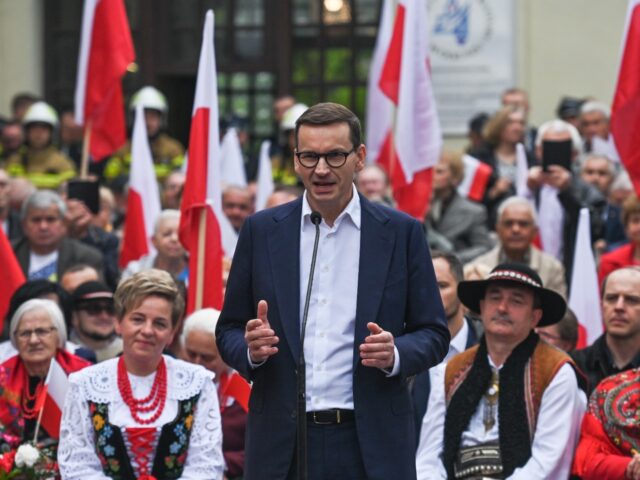The Polish people will have their voices heard in national referenda on the border wall with Belarus and on the issue of an EU agenda to force the relocation of illegal migrants into their homeland on penalty of financial sanctions imposed by Brussels.
On Sunday, Polish Prime Minister Mateusz Morawiecki announced that alongside the upcoming general election in October, Poles will be able to vote on a national referendum asking the question per Rzeczpospolita: “Do we support the admission of thousands of illegal immigrants from the Middle East and Africa, in accordance with the forced relocation mechanism imposed by the European bureaucracy?”.
The referendum comes in response to the EU coming to an agreement — against the wishes of conservative member states such as Poland and Hungary — that all countries in the bloc will need to accept the relocation of illegal migrants who entered other nations within the EU or face a financial penalty of €20,000 per each illegal they refuse to take in.
In a video posted on social media, Prime Minister Morawiecki painted a picture of stark contrasts, warning that if Poland is forced to accept waves of illegals it will face consequences similar to those seen in Western Europe, namely “rape, murders, arson, demolition of streets, horror districts,” as footage of recent racially-fuelled riots in France came onto the screen.
On Monday, the government also unveiled a fourth referendum question, whether the people would like to dismantle the wall built along the border with Belarus, which previously saw migrants being pushed ushered toward central Europe by the Lukashenko regime in Minsk in an apparent move at asymmetric warfare to destabilise the European Union, as the 2016 migrant crisis did. Alongside the two migration referendums, the Polish people will be asked if they wish to raise the age of retirement and whether they would like to privatise and sell off state-owned industries.
‘Europe’s Borders are not Secure’: Poland Vows to Veto EU Migrant Plan https://t.co/GonJ6w2F6o
— Breitbart London (@BreitbartLondon) June 30, 2023
Despite the persistent criticisms levied by Eurocrats and indeed the establishment media about Poland and Hungary somehow being less democratic than their neo-liberal counterparts to the West, the referendum and giving the Polish people a voice on the issue of forced illegal migration as well has been criticised as being an attempt to increase voter turnout for the parliamentary general election, with the supposedly politically neutral Associated Press branding the referendum questions as being “loaded“.
The left-wing British newspaper The Guardian went on to criticise Poland’s immigration stance, which has sought to block illegal migration while taking in legitimate refugees from Ukraine, over one million to date, with the paper noting that the Ukrainian refugees are “largely white and Christian”.
Both Poland and Hungary have taken in a substantial percentage of the refugees fleeing the war in Ukraine, and while leftist outlets often try to portray this as a hypocritical stance, Warsaw and Budapest have argued that as they are both neighbouring countries to Ukraine, they have a duty to temporarily house refugees, while migrants from the Middle East and Africa pass through numerous safe countries before ever reaching their doorstep.
Europe Under Attack: Polish Border Guards Again Defend Border From Belarus-Backed Migrants https://t.co/sEaPzAUv5Z
— Breitbart London (@BreitbartLondon) November 26, 2021
The treatment of the decision to hold the immigration-themed referendums in Poland is reminiscent of the Brexit vote in 2016. Now, like then, a chief opponent to the pro-national sovereignty and anti-open borders movements is former Polish Prime Minister Donald Tusk.
Tusk, who previously claimed that Brexit could lead to “the destruction of not only the EU but also of Western political civilisation in its entirety”, serves as the leader of the left-liberal Civic Platform (PO), the chief opposition to the conservative Law and Justice (PiS) government.
After serving as prime minister of Poland between 2007 and 2014, Tusk took on the far-more lucrative Brussels-based role as European Council president. During his time as the top man in the EU, he became an increasingly divisive figure at home, with conservatives and populists claiming that Tusk was more interested in serving the aims of Germany than Poland. Such was the opposition to the globalist figure, that he was controversially re-elected by other European governments — with heavy lobbying from Germany — as EU Council President despite his home country refusing to back his candidacy.
Although the press has focussed on the alleged racial implications of the referendums against illegal immigration, the true “enemy” laid out by the conservative Law and Justice party was Tusk.
Deputy Prime Minister and president of the PiS party, Jarosław Kaczyński said that Tusk is “the personification of evil in Poland” and that he intends to implement the diktats of Brussels rather than serving Poland’s national interest.
This sentiment was seconded by Prime Minister Morawiecki, who said: “Tusk is the biggest threat to our security. It is the biggest threat to Poland’s security. Let’s not let Tusk, as an envoy of the Brussels elite, demolish security in Poland.”
Ex-EU Chief Shares Photo of Himself Making Gun Gesture Behind Trump’s Back https://t.co/bel0HvADjp
— Breitbart London (@BreitbartLondon) December 6, 2019

COMMENTS
Please let us know if you're having issues with commenting.